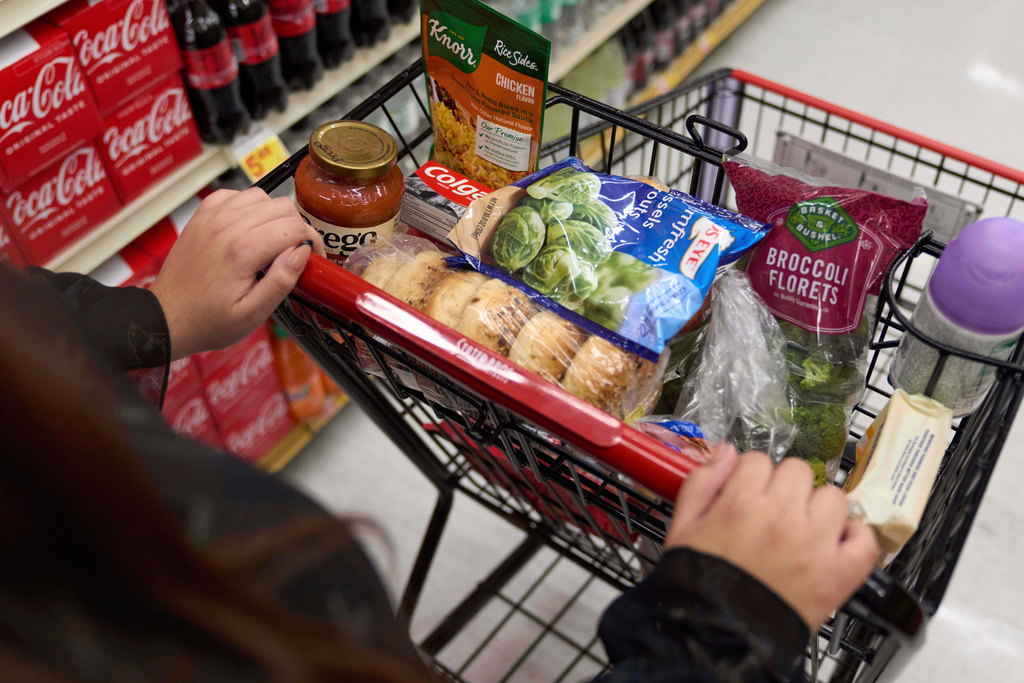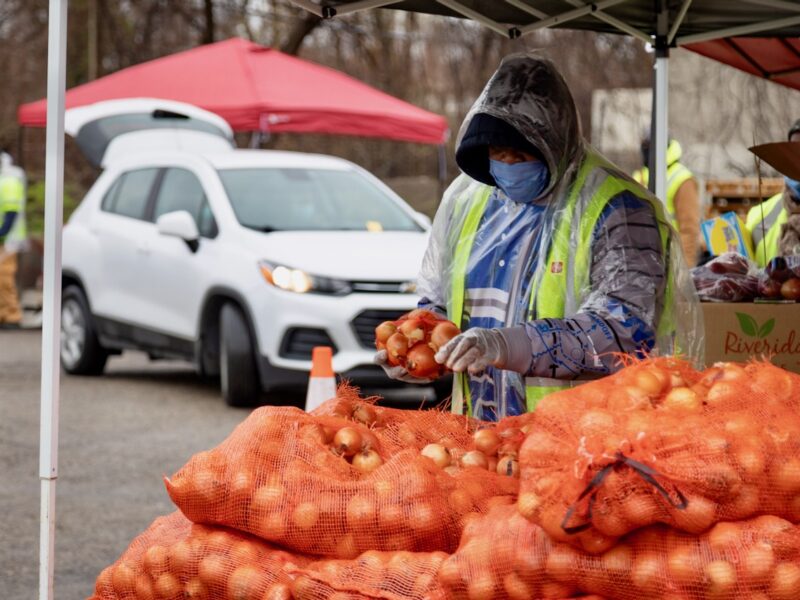Overview:
- The pause is going to be “devastating” for working families, who are already struggling with high food costs, says Fred Cabras, director of social services for the Detroit-based Capuchin Soup Kitchen.
- More than a quarter of SNAP households in Michigan are older adults, while 43% have children.
- It’s unclear what role state lawmakers might play.
By NUSHRAT RAHMAN, CLARA HENDRICKSON and TODD SPANGLER
BridgeDetroit and Detroit Free Press
The Michigan Department of Health and Human Services is pausing food assistance benefits in November until further notice.
The state received word from the U.S. Department of Agriculture’s Food and Nutrition Service directing MDHHS to hold the food assistance benefits, known as Supplemental Nutrition Assistance Program (SNAP).
The federal government, in its communication, indicated that because of the “ongoing federal government funding lapse, there may be limited availability of funds” to pay November SNAP benefits for about 42 million people across the country, according to a news release from MDHHS. In Michigan, nearly 13% of households, or roughly 1.4 million people, receive the benefits.
“The impact of households losing SNAP benefits will be felt around the state. SNAP is more than a food assistance program; it’s a lifeline for many Michigan families. It helps families put nutritious food on the table, supports local farmers and grocers, and strengthens our communities and economy. We are strongly disappointed by the USDA’s decision to delay this assistance, and in Michigan we will do what we can to help blunt this impact,” said MDHHS director Elizabeth Hertel in a news release.
Social service agencies: Pause is ‘devastating’
The pause is going to “devastating” for working families, who are already struggling with high food costs, said Fred Cabras, director of social services for the Detroit-based Capuchin Soup Kitchen.
Over the past few years, the nonprofit has already seen heightened need at its services center, providing food and clothing, and that’s only expected to increase in the coming weeks. In January 2022, the center saw 1,170 families and the number has grown; in July, Capuchin served 3,083 families.
That number is likely going to climb to upwards of 5,000, Cabras said. Households rely on food pantries and food assistance as a supplement, so they can pay their utilities and rent, especially if they don’t make enough income to cover the basics, he said. The pause is also hitting families’ budgets as they head into the holidays.
“Our busiest months often are November and December because of the holidays so this is coming at a very inopportune time for families,” he said.
Capuchin plans to increase the number of appointments at its services center and extend the hours.
Over at the United Community Family Services in Troy, CEO Kristin Olmedo said calls to sign up for the food pantry had gone up “exponentially” even before the news of the pause was official. The day before, for instance, the organization received 15 calls to register for the pantry. That’s how many calls the organization got for the whole month of June.
“We’ve been trying to keep up with the demand of new people wanting to register for our food pantry in preparation of this,” Olmedo said.
At a time of heightened need for food help, families will have to make difficult decisions on the necessities, such as medicine, food, heat and fuel, she said.
“We are a boots on the ground organization so we see our clients every day and a lot of our clients are elderly and a lot of our clients have children,” she said. “So to think tomorrow when we’re passing out food … these elderly clients are going to have to decide, what am I going to give up next month? What medicine am I not going to be able to take? Am I gonna have to be cold in my home? And for the kids, yes, they get a school breakfast and a school lunch, but what does dinner look like?”
More than a quarter of SNAP households in Michigan are older adults while 43% have children. According to MDHHS, 492,225 children benefit from the food assistance. In the 2024 fiscal year, the average Michigan household receiving SNAP benefits got $335.03 a month. On the business front, more than 9,700 retailers accept SNAP, allowing them to redeem more than $3.6 billion in 2023 alone.
Eligibility for SNAP benefits is based on income, expenses and assets and household size. The benefits are administered by the federal government, but states determine eligibility and issue benefits. The food assistance benefits are provided on electronic benefit transfer, or EBT, cards that people can use to buy food at grocery stores and farmers markets.
Lawmakers react
It’s unclear what role state lawmakers might play. State Sen. Sylvia Santana, D-Detroit, who chairs the Michigan Senate’s Appropriations Subcommittee on DHHS, didn’t completely write off the possibility of providing state funding temporarily to ensure SNAP recipients continue to receive their benefits, but she acknowledged it could be an uphill climb.
“It’s a significant amount of money to our state,” she said. “I’m not going to say no, that that’s not possible.”
However, in addition to the amount of funding it would take, it would also require significant bipartisan buy-in, she said.
State Sen. John Cherry, D-Flint, who serves on the committee with Santana, said it would be difficult to predict what temporary support from the state might look like because how long the federal government shutdown will last remains unknown.
“I mean, how do you run a budget this way?” asked state Sen. Rosemary Bayer, D-West Bloomfield, echoing Cherry.
Lawmakers also expressed concerns that the federal government might not backfill dollars if the state steps into the void to ensure SNAP benefits remain unaffected during the shutdown. Bayer also wondered whether providing state funding could send a signal to President Donald Trump that states don’t need federal support for food assistance.
Sen. Mark Huizenga, R-Walker, another committee member, described the possibility of using state funding for a federally funded program impacted by the government shutdown as likely “unprecedented.” It’s not something he suspects could happen quickly and the appetite for such an action in Lansing remains unknown, he said.
Lawmakers who spoke to the Free Press said that they had not received much if any outreach from their constituents concerned about the shutdown’s impact on them, but that could soon change, they said, if SNAP is affected. Some learned of the looming pause to SNAP benefits for the first time when the Free Press reached out.
Santana talked about supporting local organizations that provide food to communities to help them reach SNAP recipients to let them know what resources are available if benefits are paused. While the federal government “can’t get their crap together” she said the shutdown means it is imperative that “neighbors help neighbors.”
Still, lawmakers expressed concerns about philanthropy’s ability to fully make up for food assistance benefits in the event of a pause. Food banks may be scrambling to do that.
“But the need is just too great for private charity to fill these holes,” said state Sen. Jeff Irwin, D-Ann Arbor.
Michigan’s delegation in Washington, D.C. also weighed in.
“I urge the Trump administration to immediately use the USDA contingency fund or any other discretionary funds to keep SNAP running during this shutdown. If the administration refuses, I’d call on Governor Whitmer to consider using Michigan’s rainy-day funds or other reserves to provide a stopgap to keep families from going hungry. We cannot allow political games in Washington to starve our neighbors,” said U.S. Rep. Shri Thanedar, D-Detroit, in a statement.
U.S. Rep. Rashida Tlaib, D-Detroit, urged the Trump administration to act.
“The Trump Administration has already extended funding for WIC. They have the means and ability to make sure SNAP is fully funded through November, and they can do it by using SNAP’s contingency reserve fund. The average SNAP recipient only receives about $6 a day,” Tlaib said in a statement. “But don’t let them fool you, Republicans couldn’t care less about feeding hungry children. Trump just signed the largest cuts to food assistance in the history of our country into law and my Republican colleagues went on the record and voted for it.”
U.S. Rep. John Moolenaar, R-Caledonia, put the ball in Democrats’ court.
“Any further vote against reopening the government after this news is purposefully inflicting pain on the low-income families who rely on food assistance,” he said in a statement.
From U.S. Rep. Jack Bergman, R-Watersmeet, also placed the blame across the aisle.
“From low-income SNAP recipients to law enforcement and air traffic controllers, Senate Democrats are crushing constituents of the First District with their continued votes to keep the government closed. While they continue collecting a taxpayer-funded paycheck, our border patrol agents, Veterans, and other working families are being forced to go without,” Bergman said in a statement.
How to get help
To find area food pantries and other resources, go to pantrynet.org/ or call the Michigan 211 line.
MORE FROM PLANET DETROIT
Detroit food rescue partnership kicks off with 617,000 pounds of produce in 2 months
Sharing Excess, a Philadelphia-based organization that redistributes surplus food, and West Bloomfield Township-based Metro Food Rescue are collaborating to rescue up to an estimated 5 million pounds of fruits and vegetables annually for people in need. The two nonprofits headquartered in a Delray warehouse where they will sort and repack surplus produce rescued from vendors…
USDA cuts rattle Detroit’s ‘resilient’ food pantries
In Detroit, a food distribution event at Pilgrim Baptist Church has been a lifeline for hundreds of families for over a decade. Recent cancellations of $4.3 million in state food bank orders due to USDA spending reshuffles have cast uncertainty over its future.
How Trump’s tariffs are set to raise Michigan grocery prices
Trump’s tariffs on imports could lead to a 2.8% increase in food prices, disproportionately impacting low-income households and complicating decision-making for food companies and farmers.





